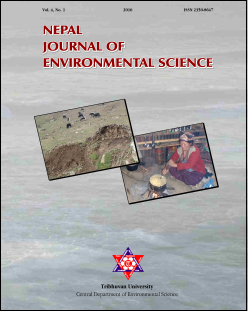Climate change perception and determinants of adoption of agricultural practices in Rasuwa district of Nepal
DOI:
https://doi.org/10.3126/njes.v4i0.22726Keywords:
Adoption, Agricultural productivity, Climate change, Rasuwa, NepalAbstract
Climate change has become unequivocal with its implications in every aspects of life and livelhood options, including agriculture. The present paper analyzes the agrarian households’ perception on climate change, identify the major agricultural practices adopted to minimize the effects of climate change and their determinants in Rasuwa district of Nepal. Nepal's agricultural production system being rain-fed in nature, the impact of climate change on productivity and production has already been experienced. During the study, the purposive sampling technique was adopted while selecting the VDCs located within the buffer zone of Langtang National Park. Four VDCs namely Laharepauwa, Dhaibung, Dhunche and Syaphru were purposively selected representing paddy, wheat, maize, and potato production area of the district. Thirty households from each VDC were interviewed by using the structured questionnaire totaling a sample size of 120 households. In addition, the present study also used Focus Group Discussions with local government officials, buffer zone communities and other stakeholders about the climate change knowledge and adaptation, and to assess perception on different climate change related threats and strategies adapted to cope the impact. Information with regard to the experience of the respondent in cultivating the crop in question, changes in rainfall amount and time, seasonal change in temperature and their effect on the time of planting and yield, and the adaptation strategy were collected. The factors influencing whether to adopt climate adaptation practices in agriculture was analyzed using binary logit model. The education level of household head, household size, food self-sufficiency from their own production and inadequacy of current knowledge on agricultural adaptation influenced the adoption. In the Nepalese context, where agricultural occupation is the dominant means of living, climate adaptation seems to be the most efficient and friendly way for farmers to neutralize the potential adverse effects. The farmer’s knowledge and skills on techniques of adaptation need to be enhanced and support in availing such practices and technologies which may result for better adoption. The awareness raising campaigns need to be organized and indigenous knowledge and practices should be documented and verified for further replication.
Downloads
Downloads
Published
How to Cite
Issue
Section
License
This license enables reusers to distribute, remix, adapt, and build upon the material in any medium or format for noncommercial purposes only, and only so long as attribution is given to the creator.

